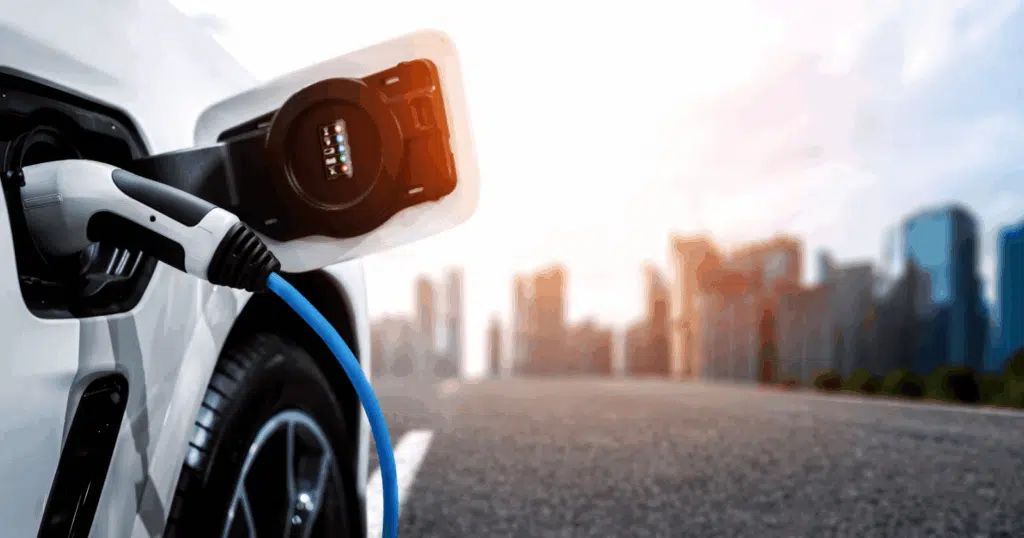Electric vehicles (EVs) are taking over Las Vegas roads, from Teslas cruising down the Strip to EV rideshares serving tourists and locals alike. As more drivers make the switch, a common question arises: How different is EV maintenance compared to traditional gas-powered vehicles—and how does the Las Vegas climate impact it?
At Universal Motorcars, we work on both electric and gas-powered vehicles, offering full-service Las Vegas collision repair, and post-accident diagnostics. In this guide, we break down everything Las Vegas EV owners need to know to keep their vehicles running efficiently and safely in the desert heat.
EVs vs. Traditional Vehicles: A Quick Maintenance Comparison
EVs are famously low-maintenance, but that doesn’t mean they’re maintenance-free. Let’s break down how they differ:
| Maintenance Task | Traditional Cars | Electric Vehicles |
| Oil Changes | Required regularly | Not required |
| Transmission Fluid | Yes (often) | Only in some EVs |
| Brake Pad Wear | High (frequent) | Low (due to regenerative braking) |
| Engine Air Filters | Yes | No engine = no filter |
| Battery Cooling Systems | N/A or basic | Critical for longevity |
| Software Updates | Rare | Frequent and essential |
| Charging System Checks | N/A | Required regularly |
While EVs eliminate many common mechanical issues, they introduce a whole new set of components that require professional attention—especially in high-heat environments like Las Vegas.
How Las Vegas Heat Affects EV Maintenance
Las Vegas isn’t just hot—it’s extremely hot, especially during summer months where daytime temperatures easily soar past 110°F. For EVs, which rely heavily on battery systems and cooling mechanisms, that heat is a serious concern.
1. Battery Thermal Management is Critical
The lithium-ion batteries in EVs are sensitive to temperature fluctuations. Excessive heat can:
- Accelerate battery degradation
- Reduce driving range
- Slow charging speeds
- Trigger battery overheating warnings
Most EVs have liquid-cooled battery systems, but those systems need regular maintenance to function properly. At Universal Motorcars, we inspect cooling lines, pumps, and thermal seals to ensure your battery stays within safe limits—even in Vegas heat.
2. Tire Wear is Faster in Hot Climates
EVs are heavier than gas-powered cars due to their batteries. When you combine that weight with hot asphalt, tire wear increases.
We recommend:
- More frequent tire rotations (every 5,000–6,000 miles)
- Heat-rated, low-rolling-resistance tires
- Wheel alignment checks, especially after hitting potholes or curbs
Proper tire care ensures safety and extends range—both key concerns for EV owners.
3. Cabin Filters and AC Maintenance
Unlike gas vehicles, EVs don’t produce engine heat—so cabin climate control relies entirely on electric compressors and fans. In Las Vegas, where AC is a must 8+ months a year, these systems can wear quickly.
Routine service includes:
- Replacing cabin air filters (every 12,000–15,000 miles)
- Servicing A/C refrigerant and checking for leaks
- Cleaning condenser coils for efficiency
Collision Repair for EVs: What’s Different?
If your EV is involved in a car accident, repairs are not as straightforward as with traditional vehicles. Here’s why collision repair for EVs must be handled by specialists:
High-Voltage Systems Require Caution
EVs run on 400V+ battery systems. Improper handling during autobody repair or frame straightening can result in severe injury—or vehicle fire. Our technicians at Universal Motorcars are trained in:
- High-voltage system isolation
- Safe battery disconnection and removal
- Post-collision battery inspection
Structural Repairs Involve Composite Materials
EVs use aluminum, carbon fiber, and high-strength steel to reduce weight. These materials require special tools and techniques to reshape, weld, or bond—standard body shops may not be equipped to handle them properly.
We use manufacturer-approved methods for EVs from brands like Tesla, Ford, Rivian, and Hyundai.
Post-Collision Range Loss or System Errors
Even minor accidents can cause misalignment of sensors or disrupt battery cooling lines—leading to reduced range or error codes. Our advanced diagnostics scan all EV systems to catch and fix these hidden issues.
EV Battery Health: What You Need to Monitor
Your battery is your engine—so don’t ignore it. Here’s what we check during routine EV maintenance:
- State of Health (SOH): Measures battery capacity vs. original rating
- Charging Port & Cable Wear: Ensures safe, fast charging
- Software Updates: Includes battery optimization patches
- Thermal Control System: Includes fans, pumps, and sensors
- Insulation Resistance Testing: Ensures safe operation in high humidity
If you’re using public fast chargers in Las Vegas, be cautious—repeated DC fast charging in hot weather can degrade battery life faster. Home Level 2 charging is often healthier long-term.
DIY Maintenance for EV Owners: What You Can Do
Some basic EV maintenance is safe for the average Las Vegas driver:
- Tire Pressure Checks: Do monthly, especially before long drives
- Wiper Blades & Fluid Top-Off: Easy DIY task
- Cabin Filter Replacement: Simple with the right guide
- Software Update Monitoring: Many EVs allow updates via Wi-Fi or app
However, anything involving electrical systems, structural parts, or high-voltage components should always be handled by professionals.
Routine EV Maintenance Schedule
At Universal Motorcars, we recommend the following EV service timeline:
| Mileage | Service Needed |
| Every 6,000 miles | Tire rotation, brake check |
| Every 12,000 miles | Cabin filter replacement, coolant inspection |
| Every 24,000 miles | A/C service, software update check, tire alignment |
| Every 36,000+ miles | Battery health report, thermal system flush, full diagnostics |
We also recommend a post-collision EV inspection regardless of how minor the accident seems.
Why Choose Universal Motorcars for EV Maintenance in Las Vegas?
We’re not just a traditional repair shop—we’re evolving alongside vehicle technology. At Universal Motorcars, you get:
✔ Certified EV technicians
✔ High-voltage system safety protocols
✔ Collision repair for all EV models
✔ Advanced diagnostics and thermal testing
✔ Local expertise in managing desert climate stress
Whether you’re driving a Tesla Model Y, Chevy Bolt, Ford Mustang Mach-E, or any other EV, we know what it takes to keep your ride smooth, safe, and reliable in Las Vegas.
Final Thoughts: Stay Charged, Stay Safe
Electric vehicles are cleaner, quieter, and more efficient—but they’re still machines that require proper care, especially in the unique environment of Las Vegas. From battery cooling to tire wear, and from accident repair to post-software update glitches, EV owners have different needs than traditional drivers.
Universal Motorcars is here to support your electric driving journey with expert repairs, maintenance, and diagnostics tailored to your EV and your city.

